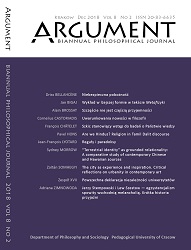“Terrestrial identity” as grounded relationality. A comparative study of contemporary Chinese and Hawaiian sources
“Terrestrial identity” as grounded relationality. A comparative study of contemporary Chinese and Hawaiian sources
Author(s): Sydney MorrowSubject(s): Social Philosophy, Contemporary Philosophy, East Asian Philosophy, Ontology, Identity of Collectives
Published by: Wydawnictwo Uniwersytetu Komisji Edukacji Narodowej w Krakowie
Keywords: Chinese philosophy; Hawaiian philosophy; social patterns; comparative philosophy; crosscultural philosophy; Fei Xiaotong;
Summary/Abstract: In this essay, I discuss a potential nexus for comparison between Hawaiian and Chinese philosophies grounded in what I call “terrestrial identity”. I bring Fei Xiaotong’s (1910–2005) description of the formation of social identity in China, which is historically agrarian and inalienably place-based, to meet contemporary Hawaiian philosophical perspectives of personal responsibility (kuleana), genealogical (moʻokūʻauhau) consciousness, and “seascape epistemology” (Ingersoll, 2016) to flesh out a new theory of relationality, one that includes the ontological, historical, and ethical relationship of humans to the land on which they orient themselves and that defines the circumstances of their lives. The concept of terrestrial identity is inclusive in terms of types of relational entities, accommodating place, space, and memory into a comprehensive social ontology. It also opens onto discussions of contemporary social problems in a way that centres place and contextuality. I will conclude this essay with such a discussion, regarding homelessness among Kānaka Maoli (Native Hawaiians).
Journal: ARGUMENT: Biannual Philosophical Journal
- Issue Year: VIII/2018
- Issue No: 2
- Page Range: 289-302
- Page Count: 14
- Language: English

